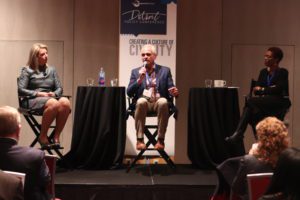Detroit ’67 Leaders: Moving Detroit Forward Requires Diversity of Opinion at the Table
March 2, 2018 For the past year, Detroit’s civic, philanthropic and business leaders have come together to commemorate the 50th anniversary of the historic 1967 summer of unrest. While many programs and events were organized around the topic, the Detroit Historical Society’s Detroit ’67 Project exuded civility for its ability to bring people together from all walks of life.
For the past year, Detroit’s civic, philanthropic and business leaders have come together to commemorate the 50th anniversary of the historic 1967 summer of unrest. While many programs and events were organized around the topic, the Detroit Historical Society’s Detroit ’67 Project exuded civility for its ability to bring people together from all walks of life.
“One of the things we recognized is we had an obligation to tell this story,” said Bob Bury, executive director and CEO of the Detroit Historical Society. “It’s an example of who we are, where we were, and where we’re going.”
Bury joined Blue Cross Blue Shield of Michigan Executive Vice President Tricia Keith and Detroit Free Press Columnist Rochelle Riley for the “Detroit ’67 Project: Commemorating History Through Civility and Collaboration” panel.
With more than 100 civic, business, cultural and community groups involved in the project’s creation, it is a positive example of how collaboration can be the catalyst for civil conversations.
“It’s important for businesses to be involved,” Keith said. “For Blue Cross, we hold dear our position in Detroit. The cultural competence of our workforce is key. So, we make sure people celebrate and understand those differences. It is up to us, as the business community, to support those places that are creating places of civility”
Bury added that the museum exhibit “Perspectives,” was curated in a way that allowed people of all backgrounds to come together and share their interpretation of the events that took place in 1967.
“We had to tell our story in an inclusive way,” he said. “‘Perspectives’ gave an opportunity for people to have those civil conversations and you saw a lot of that when people walked through the exhibit.”
Beyond the Detroit ’67 Project, panelists said business and community leaders must have the courage to embrace civil conversations on tough topics with a diversity of opinion at the table if Detroit is to truly continue its economic momentum.
“I would encourage all CEOs to talk to their diverse employees and ask what little things they can do to make things better,” Riley said. “We are still dealing with an open wound and if we’re going to fix it, we have to do so together.”
